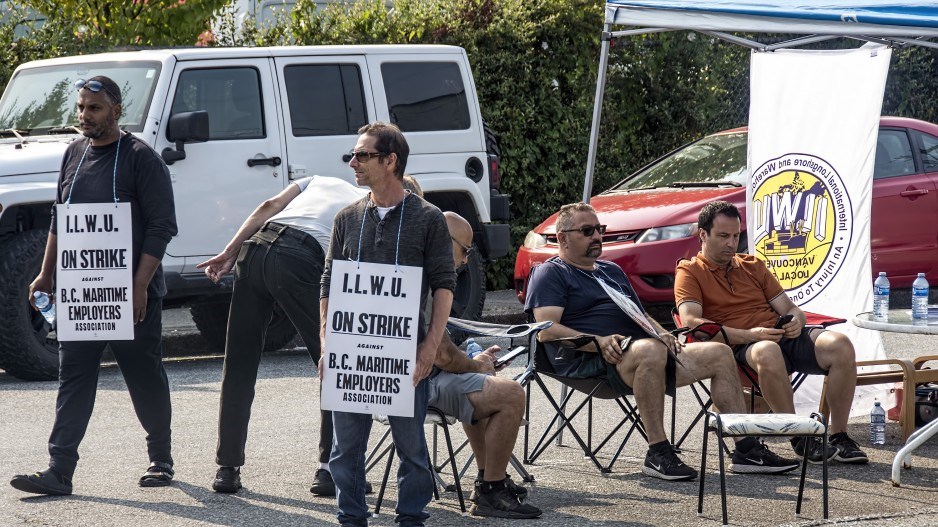The Canadian Federation of Independent Business (CFIB) wants the federal government to enact back-to-work legislation to end the strike by International Longshore and Warehouse Union Canada (ILWU) that has disrupted container cargo movement through B.C. ports since July 1.
In a release today, the non-profit organization that represents more than 110,000 business owners and enterprises across the country said that preliminary results from a survey of its membership found that more than half say the strike is adversely affecting their business operations.
“Supply chains have just started to recover from the disruptions caused by the pandemic, so many businesses will feel this latest setback extra hard,” said CFIB president Dan Kelly. “We’re hearing from members across the country who are worried about missing critical sales, delayed production or orders or an inability to get their products to export markets because of the strike. The federal government must step in and get shipments moving again as quickly as possible.”
According to the CFIB survey, only 16 per cent of businesses said the strike would have no impact on them.
Numbers from the BC Maritime Employers Association (BCMEA) released on July 10 note that, with 28 consecutive work shifts lost thus far because of the ILWU strike, $7.5 billion worth of cargo, ranging from automotive parts and refrigerated goods to critical minerals and commodities, has been potentially disrupted.
The BCMEA noted that $800 billion per day in cargo has been compromised by the strike.
Aside from wages and benefits, key issues at the bargaining table are the union’s push for expanded rights to jobs connected with maintenance work at terminals and port operations that go beyond the movement of cargo. IWLU leadership also has concerns about the increased encroachment of automation into container terminal and other port operations.
The union is seeking wage increases of 11 per cent in the first year of a new contract and six per cent in the second year. It has been without a contract since the ILWU’s previous five-year deal expired at the end of March.
ILWU Canada’s counterpart in the United States recently reached a tentative agreement on a six-year deal with the Pacific Maritime Association (PMA) that provides for a 32 per cent wage increase over the term of the contract for the 22,000 unionized dockworkers employed at 29 ports along the U.S. West Coast.
In a July 10 statement, ILWU president Rob Ashton said his union’s attempts to secure a fair wage increase “have been blocked by shipping companies and terminal employers who have seen profits explode during the last three years.”
Citing a study by Jim Stanford, economist and director of Vancouver’s Centre for Future Work, Ashton pointed out that the world’s six biggest shipping lines control 70 per cent of global shipping and all six are BCMEA members.
Ocean carriers reaped huge profits during the pandemic economy’s supply chain volatility. That earnings bonanza was driven largely by historic spikes in freight rates on the transpacific and other major trade lanes.
Ashton noted that, according to the study, “Clearly, labour is not the source of rising costs in marine shipping, and the resulting inflation. The greed of shippers and terminal operators, who took advantage of an economic and health emergency to fatten their bottom lines, is the source of the problem. Yet now business groups blame workers for disrupted shipping.”
In its July 3 statement expressing frustration over ILWU Canada’s negotiating stance, the BCMEA pointed out that the median annual ILWU Canada salary in 2022 was $136,000, plus benefits and pension. The maritime employers group added that B.C. longshore wages have increased 40 per cent over the past 13 years and 10 per cent since the pandemic began.
But the CFIB says that unless the two parties can negotiate a new deal immediately, the federal government needs to step in and settle the dispute before more damage is done to businesses across the country and Canada’s economy.
“Enough is enough,” said Jasmin Guénette, the CFIB’s vice-president of national affairs. The federal government can't just stand on the sidelines with its arms folded. They need to intervene quickly. Small businesses cannot continually bear the brunt of service and supply chain disruptions.”
Guénette’s enough-is-enough exasperation appears now to be shared by Seamus O’Regan, Canada’s minister of labour. Late Tuesday night (July 11), both sides in the port labour dispute received a letter from O’Regan stating that “After 10 weeks of mediation, and two weeks of a strike that is paralyzing Canadian exports and imports, I have asked the senior federal mediator to supply me with terms of a recommended settlement pursuant to subsection 105(2) of the Canada Labour Code.”
The labour minister gave that senior mediator 24 hours to provide him with recommendations to settle the dispute, after which they will be shared with the ILWU and the BCMEA. The labour dispute combatants will then have 24 hours to review and communicate their willingness to recommend the terms for ratification to their respective members.
Local business organizations applauded O’Regan’s action.
In a statement accompanying the July 12 release of the Greater Vancouver Board of Trade’s (GVBOT) Port Shutdown Calculator, Bridgitte Anderson, the GVBOT’s president and CEO, said the organization was pleased with the minister’s announcement, because “he has acknowledged that the strike is causing significant economic damage and that it cannot continue. Every hour our ports remain closed fuels inflation and raises prices for consumers and businesses.”
As of July 12, the GVBOT’s Port Shutdown Calculator estimated that $8.9 billion in trade has been disrupted since the ILWU began its strike on July 1.
@timothyrenshaw



